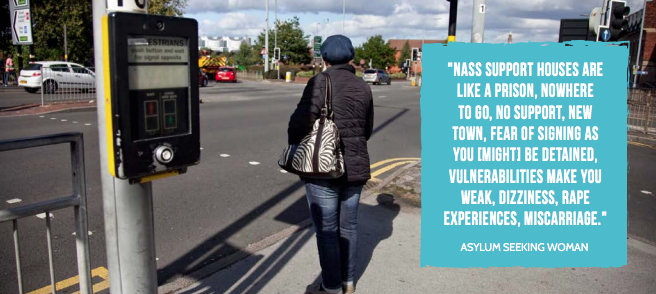
Last week, a group of civil society organisations released a report that raises acute concerns about the discrimination and violence against asylum seeking women in the UK.
The report, by the Baobab Women’s Project and Refugee Rights Europe, alongside CARAG, Women with Hope, MEENA Centre for Women and Children, and Coventry Migrant Women’s Houses, highlights the shortcomings in the UK’s fulfilment of the Convention on the Elimination of all Forms of Discrimination Against Women (CEDAW).
Key findings of the report
- Inadequate Asylum Processing System: The decision-making processes and procedures implemented by the Home Office are inadequate and lead to delays and administrative problems. There appears to be a lack of understanding and widespread disbelief of women’s experiences, a lack of legal aid funds for quality legal representation, and a lack of quality advisors addressing gender issues, coupled with insufficient engagement with support organisations.
- Lack of Access to Employment: Being prevented from the right to employment, women are more likely to be disempowered and see their skills and energy eroded, often with resulting mental health problems. It also criminalises those who do work out of necessity and facilitates forms of modern slavery which exploits vulnerable people.
- Mental Health Concerns: A key concern highlighted in this report relates to women’s mental health, including depression, PTSD and anxiety. These conditions risk being exacerbated by the current policies and practices of the Home Office, including dispersal to remote and inadequate accommodation throughout the UK and family separation. Despite this situation, refugees and asylum seekers are nevertheless less likely to receive the appropriate support needed.
- Destitution: Refused asylum seeking women are left destitute without any means of support. The effects of destitution on women is devastating: including a detrimental impact on their social standing, acute risk of exploitation, loss of self-esteem and physical and mental health problems.
- Violence against Women: Asylum-seeking women are some of the most vulnerable survivors of violence and abuse, given that they face a greater risk of destitution and poverty. Abusers are often free to manipulate women’s powerlessness (due to their insecure immigration status and fear of repercussions) with impunity. While the Domestic Abuse Bill 20191 sets out to protect and support victims and ensure agencies effectively respond to domestic abuse, we are concerned that it risks leaving migrant women behind.
What asylum-seeking women said
“My confidence was broken, made me totally different, thought the Home Office would say yes but they said no”
“When you think you’re here, you think that you’re in a country where you think they’ll understand the reasons why you’re here…but rather they make it worse”
“He said, my wife is back home, you can come and sleep with me. Exploited in 100 different ways.” “It is harder for women. We are vulnerable, very vulnerable. The things I’ve experienced since I claimed asylum, I never thought I’d experience. I’ve learnt from them but am saddened I had those experiences and they’ve affected me how they have.”
“Underwear is a difficult thing to explain to anyone; things are intimate and personal. You’ve got enough to buy underwear, then you don’t have money for milk, bread, butter…”
“NASS support houses are like a prison, nowhere to go, no support, new town, fear of signing as you [might] be detained, vulnerabilities make you weak, dizziness, rape experiences, miscarriage.”
Comments by the report authors and contributors
Sarah Taal, Advocate and Coordinator of Baobab Women’s Project and report co-author, said:
“Today we’re bringing the otherwise silenced voices of asylum-seeking women to the UN Headquarters in Geneva, calling on the UK Government to make every possible effort to eliminate discrimination towards them. We have worked with hundreds of women over the years, who are trying to find sanctuary and exercise the right to live in the UK, and who should be entitled to the same opportunities as others, regardless of nationality, or the right to remain.”
Rakinder Reehal, PhD researcher at the University of Warwick and report co-author, said:
“Our report highlights the need for increased resources to enable the Home Office to speed up asylum decisions without a compromise on the quality of decisions made. Caseworkers need to be re- educated, to put an end to the disbelief of women’s experiences, and there needs to be an increase in legal aid funds for quality legal representation and advisors addressing gender issues.”
Liz Clegg, Founder and Director of the Meena Centre, said:
“The individuals we support are faced with harrowing processes, many of whom have experienced rape, gender-based violence, trafficking and exploitation. There is so little support for these wonderful women who become isolated and many re-traumatised. Sadly, many become destitute and face possible re-trafficking here in the UK.”
A legal adviser in the West Midlands, said:
“The asylum seekers I have dealt with have spoken of the fear of sleeping on the street and the specific vulnerability they feel as women. This can, and has, led to situations where a woman feels so unsafe that she chooses to trust somebody she thinks can help, only to be exploited by that individual. For women who are survivors of rape and sexual violence, being street homeless resurfaces several fears, vulnerabilities and painful memories at a time when they do not necessarily have support mechanisms in place.”
Marta Welander, Executive Director of Refugee Rights Europe, said:
“The findings revealed through our partners’ years of experience, working directly on the frontline, call for urgent redress by the UK Government. There is a moral and legal obligation to ensure that all women, irrespective of immigration status, can access the rights and freedoms set forth within international human rights law.
















Discussion: